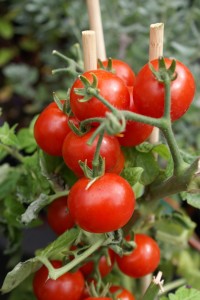Organic tomatoes contain more vitamin C and oxidative components than conventional tomatoes. This is what a study carried out by the Federal University of Ceara in Brazil has recently published on on PloS One “the impact of Organic Farming on Quality of Tomatoes is Associated to Increased Oxidative Stress during fruit development” . 
Organic agriculture exposes the tomato plant to more stress during its growth compared to conventional farming. This is the reason why more concentration of Vitamin C is found in organic tomato plants.
Most of the research that has been carried up to now on organic farming has mainly served to determine a lower concentration of toxic substances compared to what is found in conventional farming. No attention has been paid to show the benefits of organic farming and how oxidative stress may be involved in enhancing the concentration of phytochemicals of fruits and vegetable.
The Federal University of Cearà in Brazil to demonstrate how organic farming increases oxidative component selected around 30 plants cultivated by local producers of Crato-Cearà of tomato and compared them with other 30 conventional grown plants. The plants were grown at a distance of 1,5 km therefore with similar climatological conditions in rows of 1m apart with 0,4 m between plants. At the end they harvested manually selected them in order of maturity , size and uniformity. A dozen tomatoes were selected for each sample group. After the selection process they tested the concentration of nutrients in organic tomatoes and discovered that these showed around 55% more of vitamin C concentration while a 139% more of other antioxidants. Acidity increased by 29%. Organic tomatoes also seam to be smaller (40%). this may be due to nitrogen availability or from limitations to growth imposed by stressing condition in organic farming. Stress seams to impact negatively in the fruit size an it is common that organic tomatoes are smaller than conventional ones. The study demonstrated therefore that the stress factor represent a powerful leverage to increase concentration of phytochemicals.
These plants were exposed to environmental stress compared to the traditional ones and on being left without the support of herbicides the plant had to produce defense mechanisms which translates in the production of antioxidants and other characteristics that make it nutritionally healthier. It is therefore demonstrated that althought organic farming produces smaller size fruits than what is found in conventional systems it is nevertheless better in quality in terms of concentration of soluble solids and phytochemicals and phenolic compounds.
The study, if anything, suggest that conventional growers should not interfere with environmental stress to improve yield and size but should accept that some stress is beneficial in terms of quality and taste.
